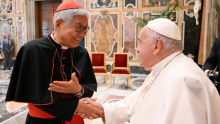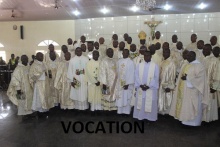Meeting with participants in the Plenary Assembly of the Dicastery for the Clergy, the Pope emphasized formation, vocation, and the importance of the permanent diaconate.
By Adriana Masotti
Pope Francis met with participants in the Dicastery for the Clergy’s Plenary Assembly in the Vatican on Thursday morning, focusing on three main aspects: the ongoing formation of priests, the promotion of vocations, and the permanent diaconate.
The Pope emphasized the importance of priests living within a network of fraternal relationships because “we are not meant to journey alone”, and expressed his gratitude for the generosity with which the majority of priests work, in the face of many difficulties.
The Pope’s gratitude
The Pope greeted the participants in the audience with affection, taking the opportunity to express his gratitude to priests and deacons worldwide:
“I have often warned against the risks of clericalism and spiritual worldliness, but I am well aware that the vast majority of priests devote themselves with great generosity and faith to the good of the holy People of God, bearing the burden of many labors and sometimes facing challenging pastoral and spiritual difficulties.”
Seminary formation is not enough
The Pope addressed each of the three themes discussed in the Plenary, starting with the central issue of formation.
He emphasized that this formation must be ongoing, especially in a constantly changing world like the one we live in today.
“We are called to consolidate, strengthen, and develop what we have learned in the seminary,” he said, “as part of a path that helps us mature, grow spiritually, find suitable languages for evangelization, and go deeper into what we need in order to adequately address the new issues of our time.”

Pope Francis with Cardinal Lazzaro You Heung-sik, Prefect of the Dicastery for the Clergy
Loneliness
For the Pope, the issue of the loneliness experienced by many priests is of fundamental importance.
“This journey is not meant to be made alone,” he said, noting that many priests lack the “lifeline” represented by a “sense of belonging.”
“Weaving a strong network of fraternal relationships is a priority task of ongoing formation … it is essential that priests feel ‘at home.’ You, as a Dicastery, have already begun to weave a worldwide network: I urge you to do everything possible to ensure that this continues and bears fruit around the world.”
The decline in vocations
The decline in vocations to the priestly and consecrated life is “one of the great challenges for the People of God,” the Pope observed.
He added that the crisis also affects vocations to marriage. For this reason, he explained, his recent messages for the World Day of Prayer for Vocations has broadened the focus “to include all Christian vocations,” particularly the “fundamental vocation of discipleship” that unites all baptized individuals.
“We cannot resign ourselves,” the Pope warned, “to the fact that for many young people, the prospect of a radical offer of life has disappeared from the horizon. Instead, we must reflect together and remain attentive to the signs of the Spirit, and you can carry out this task through the Pontifical Work for Priestly Vocations. I invite you to reactivate this reality with methods suited to our times.”
Reflection on the Permanent Diaconate
The Pope then addressed the third theme of the Plenary: the permanent diaconate, whose “specific identity” is often questioned today.
The Pope invited participants to contribute to the ongoing reflection on this ministry, as recommended by the Synthesis Report of the first Session of the Ordinary General Assembly of the Synod of Bishops last October, focusing especially “on the diaconia of charity and service to the poor.”
“Accompanying these reflections and developments is a very important task of your Dicastery. I encourage you to work towards this and to mobilize all the necessary resources.”
The Pope’s brought his address to a close by inviting participants to work “so that the People of God might have pastors according to the heart of Christ,” accompanied by Mary, “the model of every vocation.”



